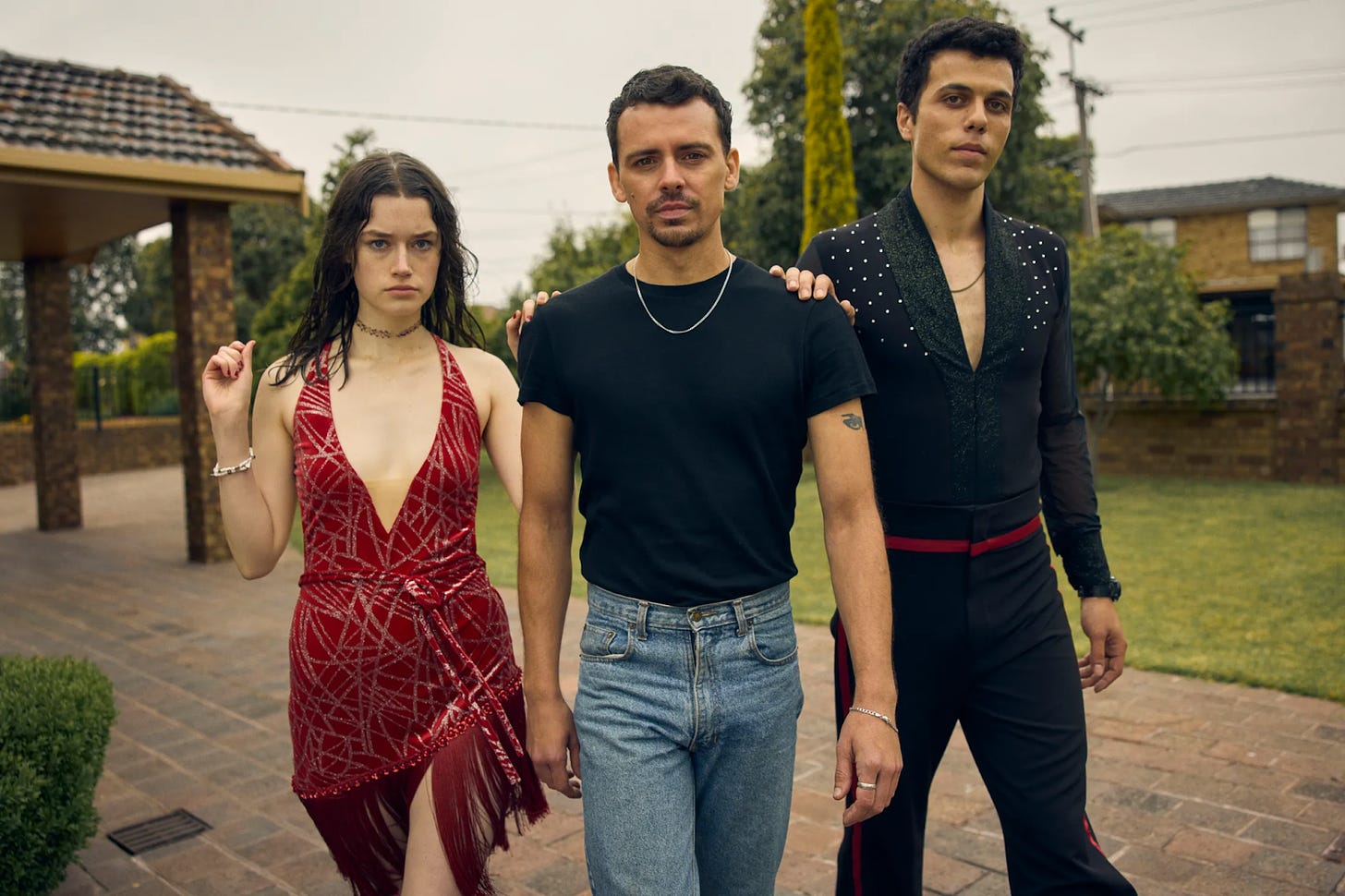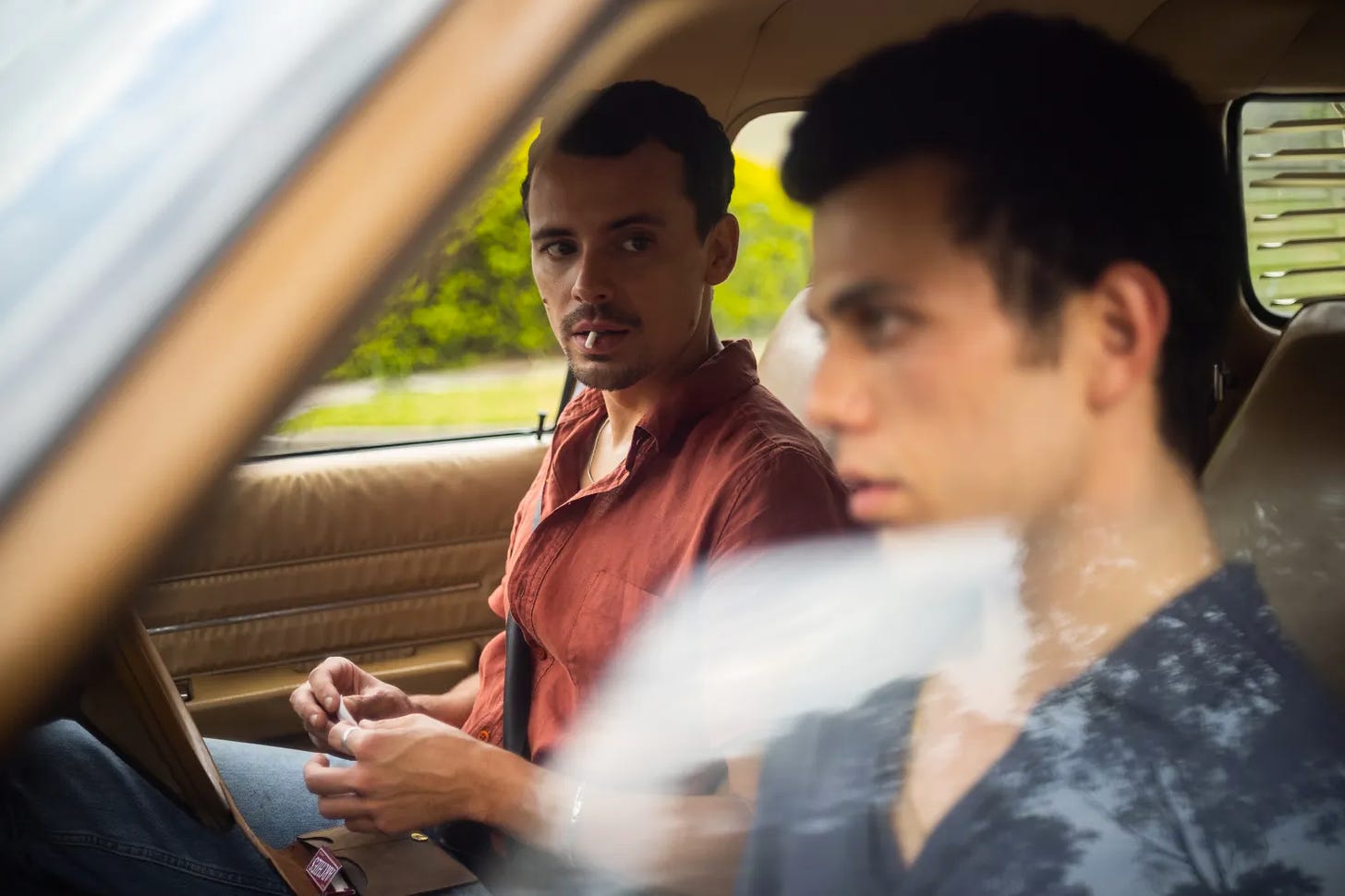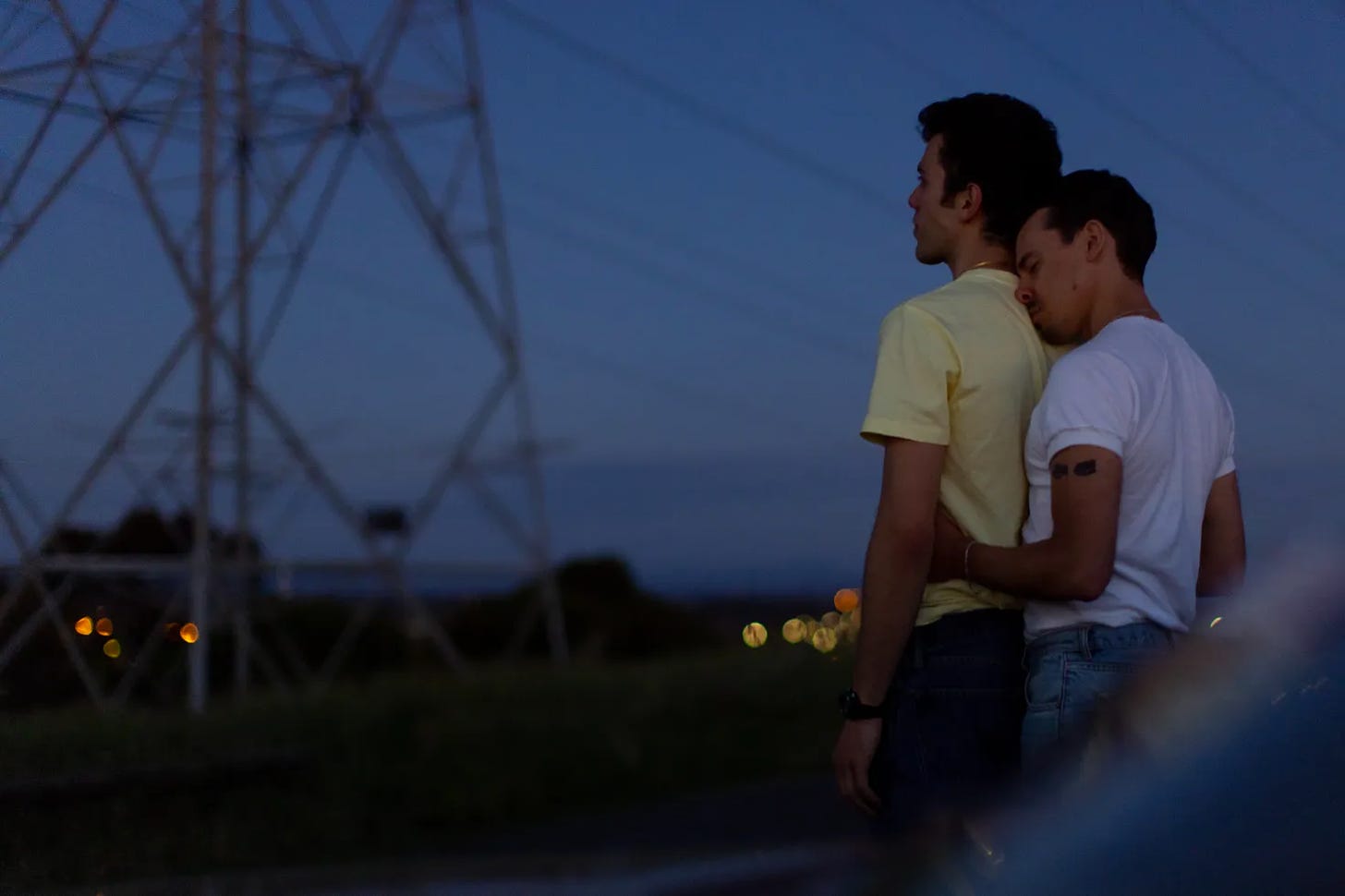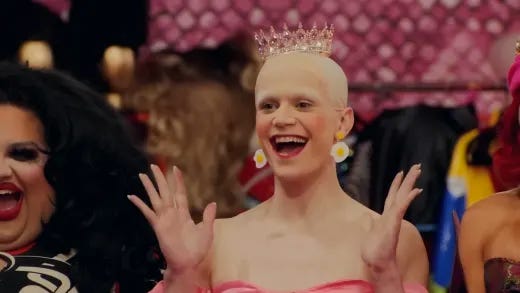Hey, my candied yams! Remember to check out ‘The Elephant in the Werkroom’ for my thoughts on this week’s Drag Race.
The Yearning Rating: ✰✰✰✰
Romance ✰✰✰✰
Sex ✰✰✰✰
Storytelling ✰✰✰½
Performance ✰✰✰
Yearning ✰✰✰✰✰
Spoilers ahead for Goran Stolevski’s Of An Age.
Written by Ali Romig
There’s queer yearning, and then there is queer yearning—the kind that transcends foundational adolescent pining and crosses into something much deeper and more all-consuming. An ache so acutely felt it never subsides, even as time marches ever onwards. This is the kind of yearning that might inspire you to write weepy poetry, to travel thousands of miles to meet a near-perfect stranger, or to imagine a freshly picked peach is your beloved and go to town on it.
While Macedonian-Australian director Goran Stolevski’s Of An Age may not be as cringy as all that, it certainly belongs to this category of ultra-yearning. At times breezy, at times cannonballing, Of An Age is a decade-spanning epic of both teenage spontaneity and the disappointments of aging. The film is split into two parts—one day in the summer of 1999, and one day in the spring of 2010. And while the merits of each part may not be entirely equal (at least, to me), they are seamlessly tied together by Stolevski’s unrelentingly energetic direction—and I mean that as a compliment.
The film starts by throwing us headfirst into chaos, perhaps portraying what navigating the world might feel like for newly-graduated Macedonian emigrant Nikola (Elias Anton) and his best friend Ebony (Hattie Hook). It’s the morning of their dance finals, where they are meant to be competing as a ballroom team, but instead Ebony wakes up alone on an unknown beach after partying all night (she only took a “hyphen of speed,” she promises). After begging for change from an unsuspecting woman and her child, Ebony desperately calls Nikola from a payphone, but it takes a while for him to answer—he’s too busy dancing sensually with himself in the garage, music blasting. He gyrates and flexes his arms around empty air as if it were a solid form; a dancer with no partner. When he finally picks up the call, his and Ebony’s frantic (and piercing) conversation seems never-ending. “Stop yelling at me!” Ebony screams angrily down the line, instead of apologizing.
Hook—in her first feature—does a phenomenal job playing this type of messy, un-self-aware BFF that I feel like so many quiet, queer kids had growing up. The observed specificity of her character and the way she interacts with Nikola only serve as further evidence that this is a film by and for queer people. Ebony undoubtedly sees herself as the main character—and the film even has a little fun with this fact, “faking us out” and kicking off the action with her. She seems so uncurious about Nikola’s inner life, while simultaneously thrusting her own onto him and everyone around her; this makes it easier for Nikola to hide the things about himself he isn’t ready to confront, even if that also means being mistreated by her at times. Theirs is an extremely well realized and hauntingly familiar dynamic.
Eventually, Ebony and Nikola manage to piece together a plan to pick her up, involving Ebony’s older brother, Adam (the exceptionally charming Thom Green). He and Nikola agree to drive to Melbourne together in search of Ebony—and here, everything about the film shifts. The previously harried pace suddenly slows as the two discover an unexpected kinship on the drive. In other films, this is the part where the director might cut to a montage of the two men laughing, drowning out their words with ambient music to gesture towards a growing connection without having to actually show it. Instead, Stolevski lets us live in this moment with Nikola and Adam. The two get to know each other as they talk about books, music, and their hometown. The camera moves away from a straight-on shot and begins to wander, lingering on parts of Adam's body—his neck, his arms, his back—as Nikola starts to take notice. There’s no soundtrack to this scene—the only music present is what’s playing from the tape deck—and it stands out for boldly eschewing any of the directorial manipulation tactics we’ve come to expect from romance movies.
While most romances tend to leave me scratching my head as to why the two main characters like each other, that’s not the case here. Nikola and Adam’s flirting may be cringy at times (“You read Kafka? Of course you read Kafka”), but it’s also incredibly recognizable—I felt the truth in every downward glance, every surprised laugh, and every self-conscious admission. Nikola’s closeted timidness also struck a chord. After discovering that Adam is queer, his flustered, faux-light questions (“Is Tori Amos like Barbra Streisand?”) give away more than he intends, and Adam patiently—yet knowingly—plays along. The new, dallying pace continues as the two spend the day together—sometimes separating and meeting back up in unexpected places—and serves to amplify the building tension. The result, both luxurious and charged, is a beautiful illustration of how the world can slow-down during an experience you know you’ll never forget.
The seemingly endless summer’s day butts up against a very Established Time-Crunch: Adam is leaving in the morning for a PhD program in South America1. I won’t give away too much of the where/when/why, but eventually the day’s-worth of longing comes to a head as the film finally allows its two main characters to give in to their now undeniable desires. This moment of sweet relief is once again refreshing in its realism. Their encounter is technically imperfect, yet endearing. While I don’t wish to enter into the Sex Scenes in Movies discourse happening right now, I will say that I love when sex portrayed on screen isn’t a perfectly choreographed performance of sensuality, but rather allows for moments of awkwardness, humor, or bashfulness. These are the little details that make a widely experienced milestone feel singular.
I have mixed feelings about Of An Age’s inclusion of a part two. In a lot of ways, I felt like this second chapter lacked the nuance of the first. Its pacing is strange and oftentimes left me wondering where it was taking us—or if it even knew. This winding road to a conclusion is punctuated by an extremely abrupt ending that felt less like an artistic choice and more like the editor throwing their hands up; “Well, we gotta end this movie somewhere, why not here?”
That said, I also appreciate the ways in which part two elevates the film from a classic coming-of-age romance into something a bit more complicated and realistic. As the two men reunite, they are forced to confront the lasting effects of their affair. Nikola, in particular, must come to terms with the vast difference between idealized memory and crushing reality. As I mentioned, in 1999, Adam’s interest in Nikola seems at least somewhat pedagogic. I do believe that he’s genuinely intrigued by Nikola, and thinks he’s special. But I also think he sees something in Nikola that reminds him of his younger self, and wants to help him along on his journey to self-discovery—show him what’s possible and kick-start his life. However, the Nikola he meets eleven years later doesn’t seem to have been able to move past their connection. Instead, he holds onto it like a life-raft.
I’m not sure if Stolevski meant for this to be a commentary on the inherent power-imbalances of these kinds of age-gap romances, but that’s how I interpreted it. While Adam is able to move on from their rendezvous, knowing what else is out there, Nikola’s relative immaturity makes it harder for him to see past this experience, especially since it lacked a definite conclusion. Acquiring an earring and learning how to roll his own tobacco cigarettes is about as deep as Nikola’s evolution goes. He’s otherwise stunted, left comparing every subsequent romantic encounter to his first—and how could any grounded, adult relationship live up to that kind of teenage fantasy? It’s a question the film leaves unanswered.
While Green shines in part one of the film, he seems to have a looser grasp on Adam’s motivation in part two. Conversely, Anton is less believable as an unsure adolescent—some of his acting in part one feels a little put on—but comes alive as the now-brawny, adult Nikola. Throughout—even as their individual characterizations waver—the chemistry between them remains strong. Longing eye contact shared from across a room holds a lot of weight in Of An Age (not unpleasantly). The movie is at its best when it focuses on the small, subtle intimacies shared between the two leads.
I’ve read other reviews of the film that have called it “thin,” lamenting the fact that Stolevski leaves too many details up in the air. But I disagree. Of An Age isn’t necessarily groundbreaking—we’ve seen whirlwind summer romances that’ve left us teary-eyed rather than swooning2 before—but I think this movie succeeds where some others have failed3 due to its lived-in specificity. Like any other slice-of-life narrative, we don’t leave the theater knowing every detail about these characters' lives, but the details we are given ring so true that it doesn’t end up mattering. In the end, the film’s ability to trust its viewer, together with its unforced yet rooted emotion, combine in a beautiful, bittersweet, and realistic reflection of first love.
Of An Age is currently in theaters, head here for showtimes.
If you enjoyed this review, please consider hitting the ♥ button on this post so that more readers can discover us on Substack!
The Elephant in the Werkroom
Episode 9:
I feel like they are really making it clear to us that Anetra’s decision to lip sync against Jax was the fair choice–but am I the only one who disagrees? I would’ve rather seen the Lip Sync LaLaPaRuza Smackdown get rid of the worst lip syncer. Isn’t that the point? Am I the drama???
This week we’re having a ball! And to celebrate the 200th episode, Ru has decided to stop coming up with new ball themes and instead is letting the queens pick a past favorite. I mean, how many new ideas can really exist at this point anyway?
I will have nightmares heavily featuring Marcia Marcia Marcia’s quick drag.
RuPaul gave us a very Spice-like performance of Cake & Candy.
How, how, how was Luxx safe?? The hair look, like crystal look? To me, those were winners. Do you agree?
After an underwhelming lip sync by both parties, it was time to say goodbye to Spice. Is it just me, or does it feel like this is where the competition really begins? (Sorry!!!)
Next week on The Yearning, Meg will review Lukas Dhont’s Close and give us the rundown on all the queer films nominated for an Oscar.
Okay, so there is still some obvious directorial manipulation happening.
As Beyonce said, “I'd like to thank the queer community for inventing the genre.”
Unlike Meg, I am not a CMBYN apologist.










THAT JUMP SCARE OF MMM 😱